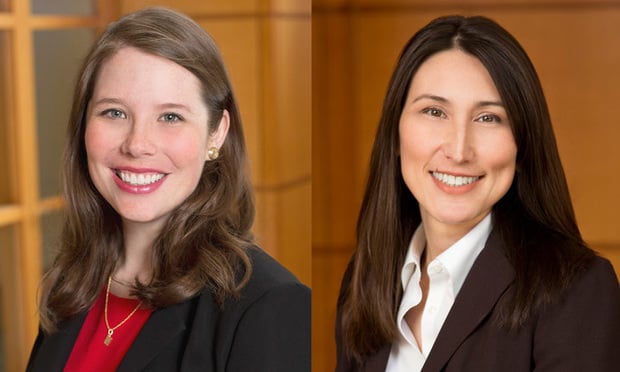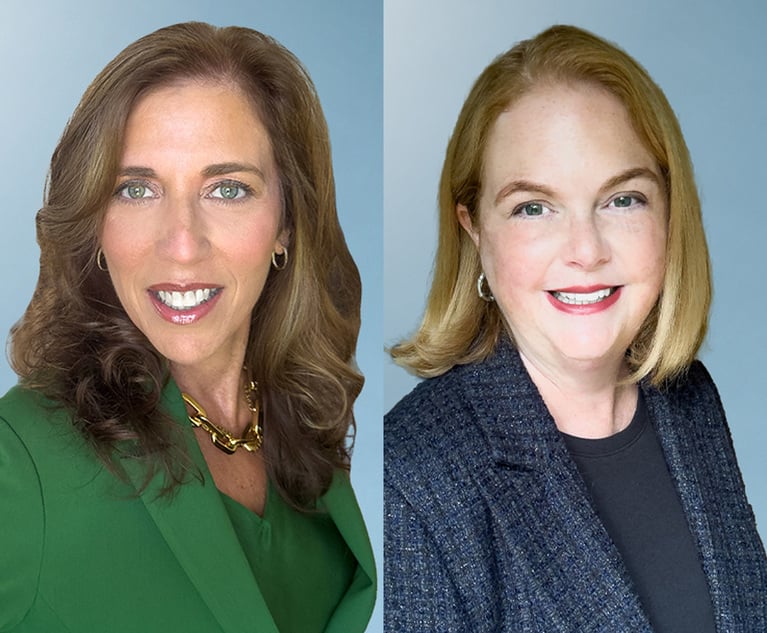Risks for Debt Collection Lawyers
Attorneys often think that an aggressive approach to litigation is part of the duty to act as a zealous advocate for clients. But attorneys who represent debt collectors may face additional risks, because California courts have held that litigation tactics may constitute violations of statutes prohibiting unfair debt collection practices.
November 22, 2017 at 10:45 AM
6 minute read

Attorneys often think that an aggressive approach to litigation is part of the duty to act as a zealous advocate for clients. But attorneys who represent debt collectors may face additional risks, because California courts have held that litigation tactics may constitute violations of statutes prohibiting unfair debt collection practices.
In particular, the federal Fair Debt Collection Practices Act (FDCPA) regulates what debt collectors can do in collecting debts. The purpose of the act is to eliminate abusive practices in the collection of consumer debts and to promote fair debt collection. A debt collector under the FDCPA includes any person who regularly collects or attempts to collect, directly or indirectly, debts owed or due or asserted to be owed or due to another. Prohibited acts include making harassing phone calls, communicating with the consumer at her or his place of employment, and misrepresenting the amount of debt owed.
In recent years, a number of courts around the country have attempted to reconcile the protections afforded to consumers under the FDCPA with the absolute litigation privilege for communications in judicial proceedings. As discussed below, courts in California and elsewhere increasingly hold that the FDCPA prevails over the litigation privilege and that attorneys may face liability for their actions in litigating a debt collection lawsuit on behalf of a client.
The Applicability of the Litigation Privilege to Rosenthal FDCPA Claims
Under California law, a violation of the Rosenthal Fair Debt Collection Practices Act (the “Rosenthal FDCPA”) establishes liability for violations of the federal FDCPA. In Komarova v. Nat'l Credit Acceptance, Inc., the California Court of Appeals held that, as a matter of first impression, the litigation privilege could not be used to shield violations of the Rosenthal FDCPA. 175 Cal. App. 4th 324, 339 (Cal. Ct. App. 2009).
In Komarova, the plaintiff asserted Rosenthal FDCPA claims against a debt collector who attempted to collect debts from her even after she established that she was not the debtor, but instead just had a very similar name to the debtor. The offending debt collection practices included the filing of an arbitration against the plaintiff and attempting to confirm an arbitration award without obtaining service of process on the plaintiff.
The court expressed concern that, if it found that the litigation privilege applied to such conduct, debt collectors could avoid liability for acts that would otherwise violate the Rosenthal FDCPA simply by filing a lawsuit against the alleged debtor. The court instead held that an exception to the litigation privilege applied to conduct specifically prohibited under the Rosenthal FDCPA. As such, litigation conduct that violated the Rosenthal FDCPA could lead to liability for the debt collector.
Following the lead of Komarova, other courts in California have held that the litigation privilege cannot shield a debt collector from liability under the FDCPA. See, e.g., People v. Persolve, LLC., 218 Cal. App. 4th 1267, 1277 (Cal. Ct. App. 2013) (holding that the litigation privilege does not apply to violations of California's unfair competition law that are based on violations of the Rosenthal FDCPA). While some federal courts in California have reached the opposite conclusion, those cases appear to be outliers. See Petley v. San Diego Cty. Credit Union, No. 16CV891 JM (RBB), 2017 WL 385742, at *5 (S.D. Cal. Jan. 27, 2017) (surveying California law and observing that the weight of recent authority dictates that the Rosenthal FDCPA prevails over the litigation privilege).
The Application of the FDCPA to Lawyers
Courts in jurisdictions around the country have reached similar conclusions. For example, the Eleventh Circuit (interpreting Florida law) held that representations made by an attorney in court filings during the course of debt-collection litigation are actionable under the FDCPA. See Miljkovic v. Shafritz and Dunkin, 791 F.3d 1291 (11th Cir. 2015).
The decision in Miljkovic is noteworthy because the court further held that the plain language of the FDCPA mandates a finding that its provisions apply to lawyers and law firms who engage in debt-collecting litigation and prohibits abusive conduct even when the debt-collecting activity is directed at someone other than the consumer—such as the debtor's attorney.
According to the Eleventh Circuit, prohibitions of the FDCPA apply to all litigation activities of debt-collecting attorneys except for pleadings, which the law specifically exempts. The Court reasoned that the purpose of the statute is to protect consumers and others from abusive debt-collecting practices, regardless of whether the activity at issue is merely a procedural aspect of the litigation.
However, despite this conclusion, the court in Miljkovic affirmed the dismissal of the plaintiff's complaint because it did not find the defendant's conduct to be abusive, deceptive, or unfair under the FDCPA. Rather, the Eleventh Circuit determined that the defendant was simply following discovery requirements under Florida law when it filed a sworn reply disputing the debtor's right to an exemption from a writ of garnishment, which formed the basis for the plaintiff's FDCPA claim.
The court in Miljkovic relied heavily on a Supreme Court case, Heintz v. Jenkins, in which the Supreme Court expressly held that the FDCPA “applies to the litigating activities of debt collector lawyers.” 514 U.S. 291 (1995). In reaching this decision, the Supreme Court considered a prior version of the FDCPA, which contained an exemption for lawyers. The Supreme Court interpreted the lack of an exemption in the current FDCPA as evidence that Congress intended for lawyers to be subject to the Act whenever they meet the general debt collector definition.
This expansive reading of the term “debt collectors” and the potential inapplicability of the litigation privilege places attorneys and law firms who engage in debt collection squarely in the purview of the FDCPA. While such attorneys do not necessarily need to alter the way they litigate cases, an extra level of vigilance can help avoid incurring unnecessary liability.
Shari L. Klevens is a partner at Dentons US and serves on the firm's US Board of Directors. She represents and advises lawyers and insurers on complex claims, is co-chair of Dentons' global insurance sector team, and is co-author of “California Legal Malpractice Law” (2014). Alanna Clair is a senior managing associate at Dentons US and focuses on professional liability defense. Shari and Alanna are co-authors of “The Lawyer's Handbook: Ethics Compliance and Claim Avoidance.” This article was prepared with assistance from Craig Giometti, an associate in the Washington, D.C. office of Dentons US LLP.
This content has been archived. It is available through our partners, LexisNexis® and Bloomberg Law.
To view this content, please continue to their sites.
Not a Lexis Subscriber?
Subscribe Now
Not a Bloomberg Law Subscriber?
Subscribe Now
NOT FOR REPRINT
© 2025 ALM Global, LLC, All Rights Reserved. Request academic re-use from www.copyright.com. All other uses, submit a request to [email protected]. For more information visit Asset & Logo Licensing.
You Might Like
View All
Once the LA Fires Are Extinguished, Expect the Litigation to Unfold for Years
5 minute read

Faegre Drinker Adds Three Former Federal Prosecutors From Greenberg Traurig
4 minute readTrending Stories
- 1ACC CLO Survey Waves Warning Flags for Boards
- 2States Accuse Trump of Thwarting Court's Funding Restoration Order
- 3Microsoft Becomes Latest Tech Company to Face Claims of Stealing Marketing Commissions From Influencers
- 4Coral Gables Attorney Busted for Stalking Lawyer
- 5Trump's DOJ Delays Releasing Jan. 6 FBI Agents List Under Consent Order
Who Got The Work
J. Brugh Lower of Gibbons has entered an appearance for industrial equipment supplier Devco Corporation in a pending trademark infringement lawsuit. The suit, accusing the defendant of selling knock-off Graco products, was filed Dec. 18 in New Jersey District Court by Rivkin Radler on behalf of Graco Inc. and Graco Minnesota. The case, assigned to U.S. District Judge Zahid N. Quraishi, is 3:24-cv-11294, Graco Inc. et al v. Devco Corporation.
Who Got The Work
Rebecca Maller-Stein and Kent A. Yalowitz of Arnold & Porter Kaye Scholer have entered their appearances for Hanaco Venture Capital and its executives, Lior Prosor and David Frankel, in a pending securities lawsuit. The action, filed on Dec. 24 in New York Southern District Court by Zell, Aron & Co. on behalf of Goldeneye Advisors, accuses the defendants of negligently and fraudulently managing the plaintiff's $1 million investment. The case, assigned to U.S. District Judge Vernon S. Broderick, is 1:24-cv-09918, Goldeneye Advisors, LLC v. Hanaco Venture Capital, Ltd. et al.
Who Got The Work
Attorneys from A&O Shearman has stepped in as defense counsel for Toronto-Dominion Bank and other defendants in a pending securities class action. The suit, filed Dec. 11 in New York Southern District Court by Bleichmar Fonti & Auld, accuses the defendants of concealing the bank's 'pervasive' deficiencies in regards to its compliance with the Bank Secrecy Act and the quality of its anti-money laundering controls. The case, assigned to U.S. District Judge Arun Subramanian, is 1:24-cv-09445, Gonzalez v. The Toronto-Dominion Bank et al.
Who Got The Work
Crown Castle International, a Pennsylvania company providing shared communications infrastructure, has turned to Luke D. Wolf of Gordon Rees Scully Mansukhani to fend off a pending breach-of-contract lawsuit. The court action, filed Nov. 25 in Michigan Eastern District Court by Hooper Hathaway PC on behalf of The Town Residences LLC, accuses Crown Castle of failing to transfer approximately $30,000 in utility payments from T-Mobile in breach of a roof-top lease and assignment agreement. The case, assigned to U.S. District Judge Susan K. Declercq, is 2:24-cv-13131, The Town Residences LLC v. T-Mobile US, Inc. et al.
Who Got The Work
Wilfred P. Coronato and Daniel M. Schwartz of McCarter & English have stepped in as defense counsel to Electrolux Home Products Inc. in a pending product liability lawsuit. The court action, filed Nov. 26 in New York Eastern District Court by Poulos Lopiccolo PC and Nagel Rice LLP on behalf of David Stern, alleges that the defendant's refrigerators’ drawers and shelving repeatedly break and fall apart within months after purchase. The case, assigned to U.S. District Judge Joan M. Azrack, is 2:24-cv-08204, Stern v. Electrolux Home Products, Inc.
Featured Firms
Law Offices of Gary Martin Hays & Associates, P.C.
(470) 294-1674
Law Offices of Mark E. Salomone
(857) 444-6468
Smith & Hassler
(713) 739-1250







